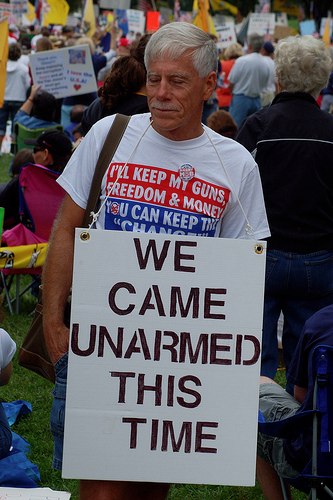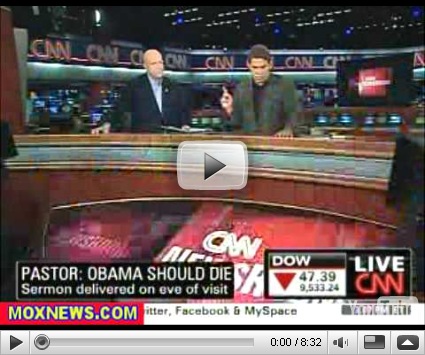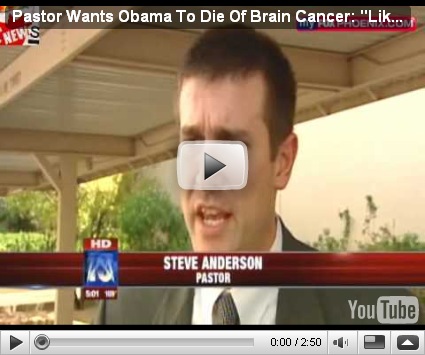Apparently I’m Not Eligible to Run for Office as a Republican; How About You?
So the Republican National Committee is considering a “purity test” to determine which candidates will get party support in the 2010 elections. For those who’ve missed this, here is the full text of the resolution (sponsored by Indiana über-conservative James Bopp):
Proposed RNC Resolution on Reagan’s Unity Principle for Support of Candidates
WHEREAS, President Ronald Reagan believed that the Republican Party should support and espouse conservative principles and public policies; and
WHEREAS, President Ronald Reagan also believed the Republican Party should welcome those with diverse views; and
WHEREAS, President Ronald Reagan believed, as a result, that someone who agreed with him 8 out of 10 times was his friend, not his opponent; and
WHEREAS, Republican faithfulness to its conservative principles and public policies and Republican solidarity in opposition to Obama’s socialist agenda is necessary to preserve the security of our country, our economic and political freedoms, and our way of life; and
WHEREAS, Republican faithfulness to its conservative principles and public policies is necessary to restore the trust of the American people in the Republican Party and to lead to Republican electoral victories; and
WHEREAS, the Republican National Committee shares President Ronald Reagan’s belief that the Republican Party should espouse conservative principles and public policies and welcome persons of diverse views; and
WHEREAS, the Republican National Committee desires to implement President Reagan’s Unity Principle for Support of Candidates; and
WHEREAS, in addition to supporting candidates, the Republican National Committee provides financial support for Republican state and local parties for party building and federal election activities, which benefit all candidates and is not affected by this resolution; and
THEREFORE BE IT RESOLVED, that the Republican National Committee identifies ten (10) key public policy positions for the 2010 election cycle, which the Republican National Committee expects its public officials and candidates to support:
(1) We support smaller government, smaller national debt, lower deficits and lower taxes by opposing bills like Obama’s “stimulus” bill;
(2) We support market-based health care reform and oppose Obama-style government run healthcare;
(3) We support market-based energy reforms by opposing cap and trade legislation;
(4) We support workers’ right to secret ballot by opposing card check;
(5) We support legal immigration and assimilation into American society by opposing amnesty for illegal immigrants;
(6) We support victory in Iraq and Afghanistan by supporting military-recommended troop surges;
(7) We support containment of Iran and North Korea, particularly effective action to eliminate their nuclear weapons threat;
(8) We support retention of the Defense of Marriage Act;
(9) We support protecting the lives of vulnerable persons by opposing health care rationing and denial of health care and government funding of abortion; and
(10) We support the right to keep and bear arms by opposing government restrictions on gun ownership; and be further
RESOLVED, that a candidate who disagrees with three or more of the above stated public policy position of the Republican National Committee, as identified by the voting record, public statements and/or signed questionnaire of the candidate, shall not be eligible for financial support and endorsement by the Republican National Committee; and be further
RESOLVED, that upon the approval of this resolution the Republican National Committee shall deliver a copy of this resolution to each of Republican members of Congress, all Republican candidates for Congress, as they become known, and to each Republican state and territorial party office.
Chief Sponsor:
James Bopp, Jr. NCM IN
Sponsors:
Donna Cain NCW OR
Cindy Costa NCW SC
Demetra Demonte NCW IL
Peggy Lambert NCW TN
Carolyn McLarty NCW OK
Pete Rickets NCM NE
Steve Scheffler NCM IA
Helen Van Etten NCW KA
Solomon Yue NCM OR
I don’t want to waste time discussing whether a purity test is a smart idea or a bad idea; hey, it’s their party. But I do want to take on each of the ten themes expressed in the test itself.
(1) We support smaller government, smaller national debt, lower deficits and lower taxes by opposing bills like Obama’s “stimulus” bill;
OK. I get that Republicans were opposed to the stimulus bill. The problem is, I don’t recall hearing many Republican ideas to help prevent the economy from taking a nose dive into a true depression. One thing that Republicans don’t seem to grasp right now is that there is a huge difference between being opposed to something and offering up a viable alternative. Think of it this way: If you suggest eating Chinese for dinner, I could say, “Gee, I don’t feel like Chinese; why don’t we go for Italian, instead.” From there, we could have an open and honest debate about which would be a better meal choice. On the other hand, if I was a Republican, my response would be more like this: “Gee, I don’t feel like Chinese (after all, they’re communists!); so we’ll just skip dinner tonight.”
I also fail to understand the constant mantra about “smaller government” as if by simply making government “smaller” we make it better. I’m less worried about the size of the government than I am with the effectiveness of that government.
As to the national debt and deficits, I seem to recall these going up, not down, under a Republican administration. It seems that Republicans are firmly opposed to debt and deficits except for debt and deficits that they like. Finally, I’d like to be certain what Republicans mean when they say “lower taxes”; lower taxes on whom? The wealthiest Americans who can easily afford to pay a bit more from the money that they’re parking in illegal offshore bank accounts? Why is it that I doubt that “lower taxes” means repeal of regressive taxes like sales tax.
(2) We support market-based health care reform and oppose Obama-style government run healthcare;
First, does that mean that Republicans will support an end to the anti-trust exemption for insurance companies? After all, an anti-trust exemption doesn’t really seem consistent with market-based insurance reform. Second, when Republicans talk about “Obama-style government run healthcare” does that mean that they oppose Medicare, Medicaid, the VA, and military healthcare? Those programs are, of course, all government run. What about the insurance provided to members of Congress? Finally, what type of reform do Republicans support? Remember that the plan offered by Senate Republicans didn’t prohibit exclusion based on pre-existing conditions (among a host of other failings). We’ve had a largely “market based” system (with anti-trust exemptions) for years and look where that’s gotten us. And how exactly do Republicans plan to handle the millions of uninsured Americans? Insuring a measly 3 million additional Americans over 10 years (while leaving 30-50 million uninsured) doesn’t really seem to be a solution to the problem. Then again, so long as the “solution” is merely opposition and obstruction…
(3) We support market-based energy reforms by opposing cap and trade legislation;
I wonder how many Republicans can actually explain what cap and trade legislation means. And, for that matter, I wonder how many of the Republicans who oppose cap and trade also believe that global warming is a myth. The funniest part of this is that cap and trade is a market-based reform. That is the whole idea; allow the market to put a value on the right to pollute and provide cost incentives for reducing emissions. And again, note that as usual, what Republicans oppose is spelled out clearly (Obama’s stimulus bill, Obama-style government run healthcare, cap and trade) but what Republicans support is much, much more nebulous (smaller and market-based). Again, it is easy to be opposed to a particular, narrowly-defined policy; it is much more difficult to articulate an alternative.
(4) We support workers’ right to secret ballot by opposing card check;
In all honesty, I don’t know enough about card check to really get into this discussion. I will note, however, that it seems strange, in the entire universe of issues for Republicans to focus on, that card check makes the top ten.
(5) We support legal immigration and assimilation into American society by opposing amnesty for illegal immigrants;
This point is one of the most insidious of all of the points on the Republican purity test. Why? Did you note that Republicans don’t just support legal immigration, but also support assimilation? In other words, Republicans are telling immigrants to come in legally, but once here, they had better jettison their cultural (and religious?) heritage and assimilate into American society. And why is that I suspect that the Republican version of “American society” is the same thing as Glenn Beck’s “white culture”?
In addition, I’m not quite sure how supporting legal immigration and assimilation is accomplished “by opposing” amnesty. What does one have to do with the other? More importantly, what precisely is the Republican plan to deal with illegal immigration and the illegal immigrants who are already here? Again, they oppose a particular policy (amnesty) without offering a solution to the existing problem.
(6) We support victory in Iraq and Afghanistan by supporting military-recommended troop surges;
First, who doesn’t support “victory in Iraq and Afghanistan”? Do Republicans really think that either President Obama or Democrats support “defeat”? It seems to me that the real question is the definition of “victory”. More importantly, I find it quite odd that when the Republican purity test finally gets around to specific things that Republicans are supposed to support, the focus is on a particular strategy advocated by the military. The last time I checked, the military was overseen by civilian leadership. It is important to remember that the issues being looked at by military planners are almost exclusively military. We don’t ask or expect military planners to look at diplomatic consequences of a particular policy, the cost to implement that policy (what about that support for a smaller national debt…?), the cost in lives or impact upon military families (I suppose that the military might factor this in to the calculation, but I don’t really know), or the desire of the American electorate to engage in the particular military operation. I suspect that generals recommended attacks on the Soviet Union during the Cold War, but we allowed civilian leadership to decide what was in the best interest of the country. So too should civilian leadership decide what is in the best interests of America when it comes to Iraq and Afghanistan. If that means a surge, then so be it; but the decision needs to be made on the basis of all known information and should take into consideration all relevant matters, not just the matters relevant to the battlefield itself. Military strategy options should be developed by military planners but decisions regarding those strategic options should be made on the basis of national interest, not just military necessity.
(7) We support containment of Iran and North Korea, particularly effective action to eliminate their nuclear weapons threat;
This one leaves me a bit puzzled. First, the use of the word “containment” harkens back to the Cold War and fears of Soviet expansion. I suspect that the real issue being “supported” is limits on the ability of North Korea or Iran to export nuclear technology or terrorism. And again, who doesn’t support those ends? Do Republicans really think that President Obama or Democrats oppose “containment” of Iran or North Korea? More problematic is the phrase “effective action to eliminate their nuclear weapons threat”. What precisely does this mean. Again, I doubt that anybody supports ineffective actions. The real question, of course, is what action would be effective? So, for example, are harsh sanctions “effective”? Maybe I’m wrong, but when I read this particular point of the purity test, I take it to really be referring to military action as the “effective action”. Maybe I’m wrong. But if not, I’m troubled by the idea that Republicans are being asked to support a military action without necessarily considering either alternatives or consequences. Forget Iran for the moment; what would be the consequences of the use of force against North Korea? Do we really want to elect leaders who want war on the Korean peninsula?
(8) We support retention of the Defense of Marriage Act;
I’m not going to take the time in this particular post to explain why I oppose the Defense of Marriage Act (and why I believe it might be unconstitutional) or to explain why I support same sex marriage (or at least domestic partnerships that have all of the benefits and obligations of marriage). Instead, I’ll simply note that of the items that Republicans apparently view as the litmus test for whether a candidate is worthy, opposition to same sex marriage counts for 10%. I still don’t understand how the issue of whether a loving, committed couple can be allowed to enjoy the benefits of “marriage” can rise to this level of importance. And, for the record, I note that those states that have allowed same sex marriage have neither imploded, been struck by wave after wave of natural disasters, nor sunken into the bowels of the earth; moreover, I note that in those states the institution of heterosexual marriage remains alive and well.
(9) We support protecting the lives of vulnerable persons by opposing health care rationing and denial of health care and government funding of abortion; and
I’m glad that Republicans oppose health care rationing. I’m curious to know how they plan to stop insurance companies from continuing to ration care or, for that matter, how they intend to stop the effective rationing for those people who can’t afford health insurance. Republicans also oppose the denial of health care. That seems like a pretty clear blanket statement; yet last time that I checked, Republicans were set against health care for illegal immigrants (remember Rep. Joe Wilson’s “you lie” moment?). And recall, once again, that the Republican health care reform proposal did not prevent insurance companies from denying coverage based on pre-existing conditions.
With regard to the funding of abortions, first I note that it is a blanket opposition. There is no nuance or exception for matters of rape, incest, or life of the mother. “Gee, sorry, that you’re gonna die ma’am, but if you can’t pay for the abortion on your own, we can’t help you!” Talk about compassionate conservatism. I also have a problem with enshrining certain types of moral issues into federal funding policies. Why, for example, are Republicans opposed to funding abortion but not drugs for erectile dysfunction or hair replacement? More importantly, why are Republicans opposed to funding abortion but not opposed to funding the death penalty, wars, torture, and illegal wiretaps? If every issue to which a large group of voters objected on moral grounds were excepted out of government funding, I suspect that very little would be funded (then again, I suppose that Republicans would view that as good, so long as the military was still fully funded). I also have a problem with the exception for abortion given that other religious traditions come to the issue of abortion with a different understanding and mindset. Thus, while the denial of funding may satisfy a conservative Christian worldview, it may also run directly contrary to a Jewish understanding of when abortion is acceptable. If my religious tradition has a different understanding of the issue, why should someone else’s religious understanding determine how federal spending impacts upon my religious beliefs? (For a more in depth discussion of religious views of abortion, see my post Keep Your Religious Doctrine Out of My State’s Laws from January 2008). I get that conservatives don’t want their tax dollars to pay for abortions; I don’t want my tax dollars to pay for torture. Republicans will do almost anything to protect the “unborn”; but once a child is born, don’t look to the Republicans for help or protection, no sir!
(10) We support the right to keep and bear arms by opposing government restrictions on gun ownership;
Like abortion, I’ve written before about my thoughts on gun control and the Second Amendment and I won’t belabor the point here. But I do want to point out the fact that the opposition to “government restrictions on gun ownership” is another blanket statement. There is no exception for children, the mentally ill, or felons (or terrorists for that matter) and there is no exception for assault rifles or armor piercing bullets or rocket-propelled grenades (or nuclear weapons…). So it would seem to me than any Republican who supports even modest gun control legislation would not pass the party’s proposed purity test.
And what happened to honoring the tenets of this recitals from the preamble of the proposed resolution:
President Ronald Reagan also believed the Republican Party should welcome those with diverse views
Somehow the notion of welcoming diverse views doesn’t seem to come through in the proposed purity test.
As a counterpoint to the Republican purity test, take a look at this purity test for Democrats proposed by Devilstower on Daily Kos:
(1) We support the rights extended to Americans extended under the Constitution. All the rights. For all Americans.
(2) We support thoughtful, pragmatic solutions that protect American lives, American standards, and American pocketbooks. This includes finding solutions that don't require bombing anyone.
(3) We support an America that has diversity in race, thought, background, and religion not out of some hazy idealism, but because it is our nation's greatest strength.
(4) We oppose torture in any form, in any place, at any time, for any reason.
(5) We support American business, and recognize that an unregulated market is an unfair market, an unstable market, and a market doomed to failure.
(6) We support American workers, and know that when workers are allowed to organize they make their jobs, their companies, and their nation stronger.
(7) We believe that the reputation of our nation is valuable and must be zealously guarded against those who place expediency ahead of law.
(8) We believe in spreading democracy and human rights to the rest of the world by vigorously upholding those ideals here at home.
(9) We believe that access to our government is not for sale. Not in the courthouse, not in the White House, and not in the legislature.
(10) We believe that the health of our planet is not a zero-sum game, not a game of "you go first," and not a game.
What is interesting is that I don’t necessarily completely agree with each and every point in this “purity test” either (for example, I’m very hesitantly willing to consider torture in a true ticking time bomb case). Nevertheless, I think that the ideals espoused by this purity test are certainly worth considering, at least as a comparison to the proposed Republican purity test. Read both sets of positions and then ask yourself in which version of our country would you rather live?
Finally, ask yourself whether a purity test like that proposed by the Republicans makes sense. Which would you prefer: (a) party that has pre-determined how its members must think and how they must vote on certain issues; or (b) a party that tells its members to think for themselves, honor their ideals and values, and represent the voters that elected them, rather than the party to which they belong.
Oh, one more thing, as long as I’m looking at purity tests and lists of values and ideals. Charles Johnson, the founder of the right-leaning blog Little Green Footballs has announced that he is parting ways with the right because of:
1. Support for fascists, both in America (see: Pat Buchanan, Robert Stacy McCain, etc.) and in Europe (see: Vlaams Belang, BNP, SIOE, Pat Buchanan, etc.)
2. Support for bigotry, hatred, and white supremacism (see: Pat Buchanan, Ann Coulter, Robert Stacy McCain, Lew Rockwell, etc.)
3. Support for throwing women back into the Dark Ages, and general religious fanaticism (see: Operation Rescue, anti-abortion groups, James Dobson, Pat Robertson, Tony Perkins, the entire religious right, etc.)
4. Support for anti-science bad craziness (see: creationism, climate change denialism, Sarah Palin, Michele Bachmann, James Inhofe, etc.)
5. Support for homophobic bigotry (see: Sarah Palin, Dobson, the entire religious right, etc.)
6. Support for anti-government lunacy (see: tea parties, militias, Fox News, Glenn Beck, etc.)
7. Support for conspiracy theories and hate speech (see: Alex Jones, Rush Limbaugh, Glenn Beck, Birthers, creationists, climate deniers, etc.)
8. A right-wing blogosphere that is almost universally dominated by raging hate speech (see: Hot Air, Free Republic, Ace of Spades, etc.)
9. Anti-Islamic bigotry that goes far beyond simply criticizing radical Islam, into support for fascism, violence, and genocide (see: Pamela Geller, Robert Spencer, etc.)
10. Hatred for President Obama that goes far beyond simply criticizing his policies, into racism, hate speech, and bizarre conspiracy theories (see: witch doctor pictures, tea parties, Birthers, Michelle Malkin, Fox News, World Net Daily, Newsmax, and every other right wing source)
And much, much more. The American right wing has gone off the rails, into the bushes, and off the cliff.
I won’t be going over the cliff with them.
I disagree with Charles Johnson on many issues, but I’ve always found him to be reasonable and fair minded. When he takes a position, he almost always backs it up. Ever since I came across Little Green Footballs during the Israel-Lebanon war in 2006, I’ve found his site to be a destination to see what the rational right is thinking. As Johnson has frequently noted over the last several months, too often what the right is thinking isn’t rational at all.
So anyway, it looks like I won’t be eligible to run for office as a Republican in 2010. Shucks.
Labels: Abortion, Economy, Environment, Foreign Policy, Gun Control, Health, Immigration, Laws, Politics, Religion
















